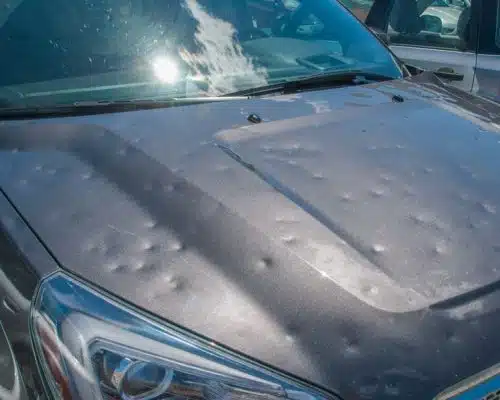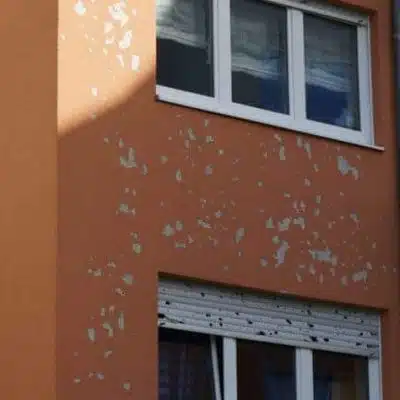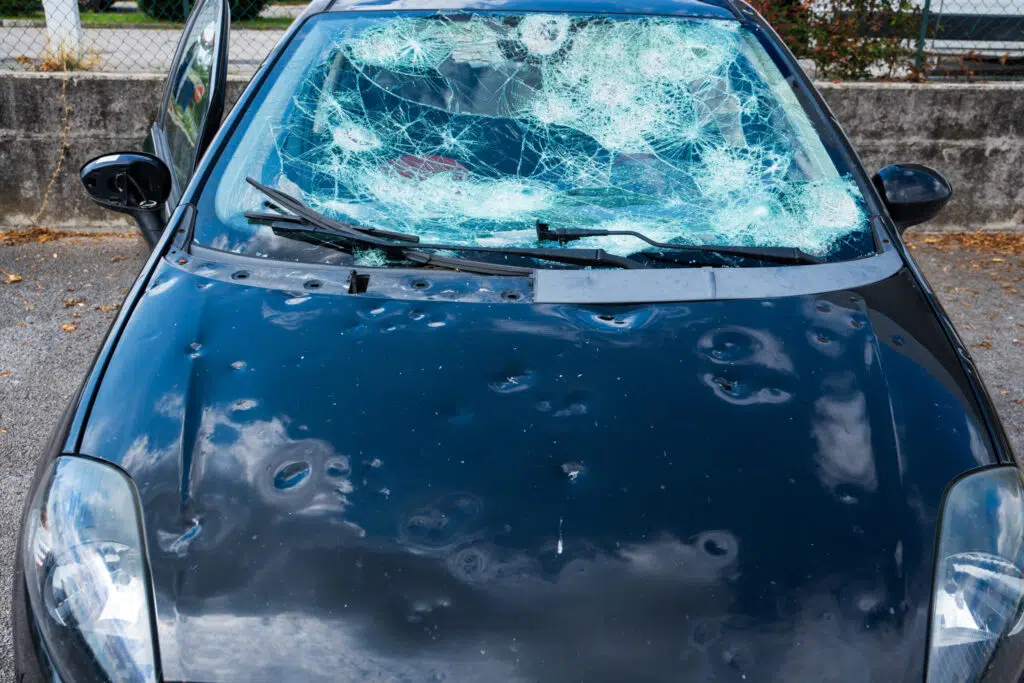Hail Damage Attorneys
Hail storms can cause a lot of damage to both buildings and cars. Millions of people across the country are affected by damage from hail storms every year. That damage can cost property owners thousands of dollars. Hail damage should be covered under most standard insurance policies. However, insurance companies are businesses and may be more interested in profit than in paying what is needed to repair the damaged property.
Home » Insurance Dispute Lawyers » Property Damage Attorneys » Hurricane Damage Attorneys » Hail Damage Attorneys
Bad Faith Insurance Attorneys
Business Interruption Lawyers
Fire Smoke Damage Attorneys
First-Party Vs. Third-Party Insurance Claims
Hurricane Damage Attorneys
Insurance Claim Denial Lawyers
Insurance Dispute Lawyers
Pipe Burst Attorneys
Property Damage Attorneys
Roof Damage Attorneys
Water Damage Attorneys
Although hail storms are most common in Wyoming, Nebraska, and Colorado (this region is called Hail Valley), hail storms can strike anywhere. Even southern states like Florida and Georgia are not immune. Anyone could experience damage from hail no matter where they live or own property. Hail damage is actually one of the most common reasons for claims on homeowners’ insurance. Up to 70 percent of claims made are because of hailstorm damage.
Hailstorm damage can have a severe impact on your life. Your insurance company is supposed to protect you. They should be held responsible for ignoring your needs. Unfortunately, getting the insurance companies to do the right thing is a long road, and it’s even tougher without a lawyer experienced in hailstorm damage claims.
If your property has been damaged by hail and your insurance company has denied your claim, Farah & Farah can help. You may have a legal claim against the insurance company. Don’t wait to contact us for a free consultation.

Damage Caused By Hail
Depending on the size, speed, and angle of the storm’s winds, hail can cause a lot of damage. This damage can occur to any property that is open to the weather. This can include any building and vehicles that are not protected by a garage.
Damage to Cars
Hail damage to cars can include:
- Dents in the body of the car
- Broken windshield
- Broken windows
- Damaged engine
Damage to Buildings
Hail damage can cause widespread damage to homes. Even small hail can cause thousands of dollars in damage. Repairs for hail damage should happen quickly to prevent future damage.
Hailstorm damage to homes and other buildings can include:
- Broken windows or screen damage
- Dents on a metal roof
- Roof damage including damaged or missing shingles, dented metal roofs
- Leaks
- Flashing and vent damage
- Damaged siding
- Peeling paint
- Exposed and rotting wood
- Damaged air conditioner
- Damaged chimneys and flue vents
Is Hail Damage Covered By Insurance?
Whether or not hail damage is covered depends on the insurance company and the policy. Typically, homeowners insurance should protect you from hazards like hailstorm damage, theft, fire, lightning, windstorms, and vandalism.
Here are some important things to know about filing an insurance claim for hail damage:
Dwelling Coverage (Coverage A)
Dwelling Coverage, which is also called Coverage A, is the part of your homeowners’ insurance policy that handles any rebuilding or repair to your home that is necessary because of perils such as wind, hail, storms, and more. Hail is usually one of the perils included in a standard Coverage A policy.
Usually, hailstorm damage is covered by standard homeowners’ insurance policies under Coverage A or dwelling coverage. Dwelling A coverage usually includes parts of the house like roofs, windows, decks, appliances. In some cases, this coverage includes outbuildings like tool sheds or garages.
Not every insurance policy is the same. You should, however, check the amount your policy covers. It should be enough to cover the entire value of your home in the event something happens to cause a total loss.
Hail Insurance
There is a type of special hail-specific insurance, but it’s typically only purchased by farmers. Called crop-hail insurance, this special insurance covers damage done to crops by hail.
Hail Deductible
Your insurance policy may have a deductible in place for certain types of damage, including hail. If this is the case for your insurance, there will be a specific dollar amount that you will have to spend on repairs before your insurance company would start to pay anything.
You’ll have to check your individual policy to ensure that it covers all areas of your property, including detached structures such as sheds or a garage. In addition to thoroughly reading your policy, you can also contact your insurance company and ask them what hail coverage your current policy has.
Additional Coverage
While most homeowners insurance policies can protect you from hail, it can be a good idea to add coverage options. Many providers include additional provisions for roof replacement, siding, sheds, fences, swimming pools, and other structures. Your insurance provider will let you know about these premium insurance options.
Does My Car Insurance Cover Hail Damage?
If you have auto liability insurance only, then your insurance may not cover hail damage to a vehicle. Comprehensive insurance policies typically do cover hail damage. However, whether or not hail damage is covered may depend on the exact policy and the insurance company that you have. It’s recommended to thoroughly read through your policy so you know exactly what is covered.
Filing an Insurance Claim for Hail Damage
If your home has been damaged by hail, it’s important to first make a claim to your insurance company before taking any legal action. It’s important for the hailstorm damage claim to be done correctly on your end. You don’t want to give the insurance company any reason to deny the claim.

Assess the Damage
The first step in making a claim is to assess the damage. Inspect your property and look for anything that was broken or damaged. Look for broken windows, damaged siding, damage to your roof, and even look at your air conditioner. Inspect anything that is open to the outside, including any decks, sheds, and garages that are on your property.
It may be more difficult to thoroughly assess the damage to your roof, but you can hire a professional to look at it even before you contact your insurance company. Many roofing companies may actually offer inspections for free, hoping that you will return to them for the actual roofing repairs.
Photograph the Damage
As you assess the damage done by the hail, it’s important to collect photographic proof. Take pictures of everything you can. You’ll want to have proof that the damage occurred, especially before repairs have begun.
Have the Damage Professionally Inspected
If you’re making an insurance claim, the insurance company will send out an adjuster to assess the damage. However, their assessment may be biased in favor of the insurance company. Having an independent inspector come out and assess the damage to your property can give you a better idea of the real cost of the damage. A professional not affiliated with the insurance company can help you avoid struggling with a claim smaller than what is actually needed.
Plus, hailstorms don’t always cause damage that needs repairs. If the damage is cosmetic only, then you may be advised to not bother making a claim at all. Insurance companies don’t always cover cosmetic damage and a professional may advise you to wait to make any repairs.
It may be a good idea to have the professional at your home at the same time as the insurance adjuster. That way, they can point out the damage to the adjuster so you can be sure that it won’t be missed.
Review Your Insurance Policy
Ideally, you should already know what your insurance policy covers, but after a hailstorm is a good opportunity to review. You should know whether or not your insurance company will cover everything that was damaged or if there are any restrictions. Some insurance policies won’t cover what they consider to be cosmetic damage. Some may have a deductible that you have to meet before your insurance company will pay anything.
Notify Your Insurance Company
If there is damage that needs to be repaired, the next step is to actually make the claim. It’s a good idea to make the claim as soon as possible. Hail can cause roof leaks that, if left unrepaired, can cause devastating damage to the inside of your home. If your air conditioner was damaged and even if it’s in usable condition, continued use may damage it more or mean that it needs to be replaced entirely. Other damage can get worse over time and cause more damage elsewhere to your property if it’s not addressed promptly.
Your insurance company will not pay for damage caused by a delay in repair. They would only pay what they have determined is the value of the actual damage caused by what your policy covers, within the limits of your policy and after any deductibles.
Keep Maintenance Records
As repairs are made, keep full records of everything that was done. This will be important if your insurance company is reimbursing you for out-of-pocket costs rather than providing you with the money upfront. If you have a deductible, you’ll need records of what you’ve paid so you have proof that you have met the deductible.
Log All Correspondence
Almost every insurance nightmare started out as a simple claim. Make sure you keep a record of every interaction with the insurance company. Include assets like photos, call logs, who you spoke to, and what directives you were given. If things go sideways, these records may come in handy!
Why Was My Hail Damage Claim Denied?
First and foremost, insurance companies are businesses. This means that they’re looking to make a profit, which means they’ll be looking for opportunities to deny claims so that they don’t have to pay. An insurance company may have a very good reason to deny a claim, but often denials can be made in bad faith as the insurance company tries to get out of paying for the damage.
In order to fight a claim denial, it’s important to first understand exactly why your claim was denied in the first place.
Disagreement About Cause of Damage
If your insurance policy covers hail damage, the insurance company may try to claim that it was caused instead by a peril that isn’t covered under your policy. This would eliminate their responsibility to pay for the damage. It’s for this reason that it’s important to have your home professionally inspected, to keep all documentation, and to photograph all damage. You’ll want to be able to prove that the damage was indeed caused by hail and not by wear and tear.
Failure to Meet Conditions
Another reason the insurance company could deny your claim is that you did not file properly or you didn’t meet all of the conditions for the claim. It’s important to be familiar with all of the terms of your policy and what the requirements are for making a claim. This can help you avoid giving your insurance company an excuse to deny your claim based on a failure to meet policy or claim requirements.
Difference in Valuation
Even if your insurance company doesn’t deny your claim, you may not receive as much as the damage actually costs. This may be due to a deductible built into your policy, but it also may be because of a difference in the valuation of the damage. This is where bringing in an independent professional inspector can benefit you. Anyone brought in by the insurance company to inspect the damage could be biased in favor of the insurance company and value the damage lower than it really is.
Hail Damage Attorneys in Florida & Georgia are Ready to Serve Your Case
If your property has been damaged by hail and your insurance company has denied your claim or has not paid enough for the cost of the damage, you may have a case. An experienced hail damage attorney such as those at Farah & Farah can help you understand exactly what your insurance policy is supposed to cover and whether your insurance company made a denial of your claim in bad faith.

Our legal team is composed of expert lawyers experienced in hail damage law. We can help you seek the compensation and justice you deserve. Contact us as soon as possible for a free consultation. You won’t pay a cent unless your case is successful.

free case review
Related Pages
Client Testimonials

Related Blogs













